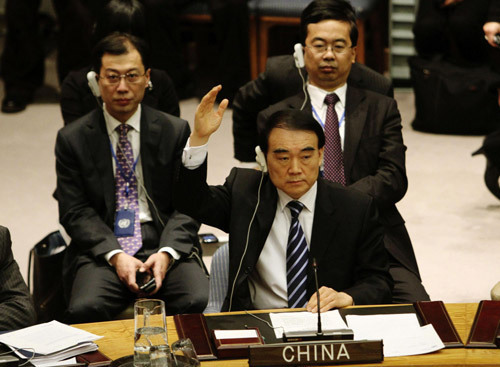
 |
|
China's Ambassador Li Baodong (front) votes during a UN Security Council meeting on an Arab-European draft resolution on Syria backing an Arab League plan which demands a regime change in the Middle East country, New York February 4, 2012. [Photo/Xinhua] |
UNITED NATIONS - Russia and China on Saturday joined hands in vetoing an Arab-European draft resolution which backs an Arab League plan to promote a regime change in Syria.
It was the second time since October 2011 that Russia and China used double veto to block a UN Security Council resolution on Syria, which they deemed not the best choice to promote peace in the Middle East country.
The unadopted draft resolution meant to say that the Security Council "fully supports" the January 22 Arab League plan to ask Syrian President Bashar al-Assad to step down, one of the major stumbling blocks in pre-vote consultations which Russia strongly opposed.
The draft also urged efforts to "facilitate a Syrian-led political transition to a democratic, plural political system ... including through commencing a serious political dialogue between the Syrian government and the whole spectrum of the Syrian opposition."
At the unusual weekend council meeting, 13 council members voted in favor of the draft resolution. But, in order to be adopted, a UN draft needs nine votes in favor and no veto by any of the five permanent members of the 15-nation council -- Britain, China, France, Russia and the United States.
Russia-China concerns
Russia and China, two veto-wielding council members who have both been closely following the situation in Syria, used the double veto on the ground that more consultations were needed to achieve a proper settlement of the Syrian issue.
They argued that the co-sponsors, including Arab states and the United States, Britain and France, failed to take into account the reasonable concerns of Russia, which insisted that the draft resolution, tabled by Morocco, be amended.
Hours before the council entered into the scheduled meeting on Saturday morning, with Western powers pushing for a council vote on the draft, Russia circulated an amended resolution which, as Russian Foreign Minister Sergei Lavrov said, "aims to fix two basic problems."
There were "(first,) the imposition of conditions on dialogue, and second, measures must be taken to influence not only the government but also armed groups," Lavrov said at a panel discussion at the Munich Security Conference, adding that these two issues are "of crucial importance" from the view of Russia.
The co-sponsors of the resolution, however, did not taken into account these concerns.
"The draft resolution that was put to a vote did not adequately reflect the real state of affairs in Syria and has sent an unbalanced signal to the Syrian parties," Russian UN Ambassador Vitaly Churkin said after the vote.
Churkin said that Russia will continue to work for a solution to the crisis in Syria because "bloodshed and violence in Syria has to be ended immediately."
According to Churkin, Russian President Dmitry Medvedev has instructed Foreign Minister Sergey Lavrov and Mikhail Fradkov, the director of the service for external intelligence of Russia, to travel to Syria on February 7 to meet with Syrian President Bashar al- Assad.
"We believe that intensive efforts of the international community with a view to putting an immediate end to the violence and having a successful beginning and conclusion of an exclusively Syrian political process and withdrawal of the country from this crisis will be continued," said Churkin.
For his part, Li Baodong, the Chinese permanent representative to the United Nations, regretted that the Russian amendments were ignored.
"China supports the revision proposals raised by Russia, and has taken note that Russian Foreign Minister (Sergei Lavrov) will visit Syria next week," Li told the council. "The request for continued consultation on the draft by some council members is reasonable."
"It is regrettable that these reasonable concerns are not taken into account," he said. "To push through a vote when parties are still seriously divided over the issue will not help maintain the unity and authority of the Security Council, or help resolve the issue."
"In this context, China voted against the draft resolution," Li said.
International responses
UN Secretary-General voiced his deep regrets over the council's failure to adopt the draft resolution.
"The secretary-general deeply regrets that the Security Council has been unable to agree on a resolution supported by the League of Arab States to bring an early end to the violence and the killing in Syria," said a statement released here by Ban's spokesman Martin Nesirky.
Morocco's UN envoy, Mohammed Loulichiki, voiced his "deep regret and disappointment," saying that he was "extremely frustrated" by the failure of the resolution.
Furthermore, the United States and France responded to the double veto with fury.
"The United States is disgusted that a couple of members of this Council continue to prevent us from fulfilling our sole purpose here -- addressing an ever-deepening crisis in Syria and a growing threat to regional peace and security," said US Ambassador Susan Rice.
French Ambassador Gerard Araud said it was "a sad day for the Security Council." France, together with other Western powers, pushed for an early council vote despite strong Russian calls for more consultations to amend the draft.
Syria, which has all along voiced strong opposition to any foreign intervention in its internal affairs, on Saturday reiterated that Damascus prefers to see a political settlement within Syrians themselves and the Arab family.
"Given our firm belief in the Pan-Arab role, we had hoped that the examination of the question of Syria first exclusively in the Syrian household and then in the larger, supporting Arab structure, " Syria's permanent representative to the UN Bashar Jafaari told the Security Council.
"But the rush by some parties to invite international intervention, which we know in advance the objectives of its dealing with Arab issues, first and foremost the question of Palestine and the Israeli occupation of Arab territories is a cause for concern," he added